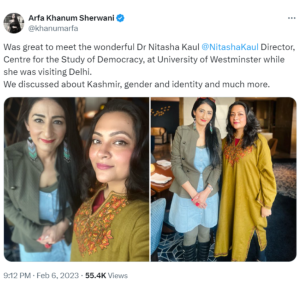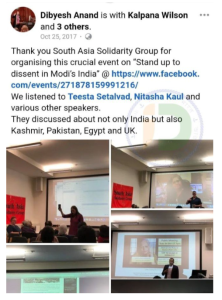V
Vedant Pathak
Guest
India, a land of diverse cultures, ideologies, and opinions, has recently witnessed a heated debate surrounding the denial of entry to Nitasha Kaul, an intellectual and professor. Her deportation to London sparked curiosity and controversy, with questions raised about the reasons behind this decision. In this article, we delve into the intricate web of Nitasha Kaul’s affiliations, actions, and statements, shedding light on the truth that lies beneath the surface.
Nitasha Kaul, known for her intellectual pursuits and academic contributions, found herself barred from entering India. The trigger? An invitation from the Congress-ruled Karnataka government to speak on democratic and constitutional values. But is this the complete story? Let’s explore further.
Kaul’s track record is far from ordinary. Her testimony against India in the US Congress regarding the Kashmir issue raised eyebrows. Additionally, she maintains connections with anti-India organizations such as HfHr (Hindus for Human Rights), IAMC (Indian American Muslim Council), and Stand with Kashmir. In the past year, Nitasha Kaul engaged in a conversation with the controversial journalist Arfa Khanum Sherwani. The duo explored subjects related to Kashmir, gender, and identity. Their interaction extended to the Parliament of the World’s Religions in Chicago in 2023.
These affiliations form a significant part of her resume, leaving no room for neutrality.


Kaul’s personal life intersects with activism. She secretly married gay rights activist Dibyesh Anand, a vocal advocate for LGBTQ+ rights. Together, they attend anti-India seminars and engage in discussions on sensitive topics. Their union blurs the lines between personal beliefs and public discourse.
In 2019, Kaul testified before the US Congress, urging censure against India for abrogating Article 370 in Kashmir. Her vocal opposition to a law aimed at restoring equal rights in the region raises questions. Why this sudden interest in India just before the elections?
Kaul’s presence at anti-India events organized by the South Asia Solidarity Group and the Asian American Resource Workshop further complicates matters.

Media outlets like The Wire and The Caravan have provided Kaul with space to express views that undermine India. Her words resonate globally, painting a picture of dissent and skepticism. But what drives her relentless critique?


Considering Kaul’s glittering achievements in demeaning India on the world stage, her entry denial becomes clearer. Dr. Gautam Sen’s “mistaken” identification of her as a representative of the Pakistan embassy adds intrigue. The truth lies somewhere between activism, affiliations, and personal convictions.
Nitasha Kaul’s case serves as a microcosm of the larger debate on intellectual freedom, national security, and the delicate balance between criticism and loyalty. As India grapples with its own complexities, Kaul’s story remains a cautionary tale—a reminder that every action has consequences, especially when it involves matters of the heart and the nation.
The post Unraveling the Controversy: Nitasha Kaul ’s Entry Denial to India appeared first on The Jaipur Dialogues.
Continue reading...
The Ban and Its Context
Nitasha Kaul, known for her intellectual pursuits and academic contributions, found herself barred from entering India. The trigger? An invitation from the Congress-ruled Karnataka government to speak on democratic and constitutional values. But is this the complete story? Let’s explore further.
Kaul’s track record is far from ordinary. Her testimony against India in the US Congress regarding the Kashmir issue raised eyebrows. Additionally, she maintains connections with anti-India organizations such as HfHr (Hindus for Human Rights), IAMC (Indian American Muslim Council), and Stand with Kashmir. In the past year, Nitasha Kaul engaged in a conversation with the controversial journalist Arfa Khanum Sherwani. The duo explored subjects related to Kashmir, gender, and identity. Their interaction extended to the Parliament of the World’s Religions in Chicago in 2023.
These affiliations form a significant part of her resume, leaving no room for neutrality.


Personal Ties and Activism
Kaul’s personal life intersects with activism. She secretly married gay rights activist Dibyesh Anand, a vocal advocate for LGBTQ+ rights. Together, they attend anti-India seminars and engage in discussions on sensitive topics. Their union blurs the lines between personal beliefs and public discourse.
Testimony Against Article 370
In 2019, Kaul testified before the US Congress, urging censure against India for abrogating Article 370 in Kashmir. Her vocal opposition to a law aimed at restoring equal rights in the region raises questions. Why this sudden interest in India just before the elections?
Kaul’s presence at anti-India events organized by the South Asia Solidarity Group and the Asian American Resource Workshop further complicates matters.

These platforms have hosted individuals who are critical of India’s policies. Her alignment with such voices adds fuel to the fire.

Media Platforms and Venom
Media outlets like The Wire and The Caravan have provided Kaul with space to express views that undermine India. Her words resonate globally, painting a picture of dissent and skepticism. But what drives her relentless critique?


The Denial and Dr. Gautam Sen’s Perception
Considering Kaul’s glittering achievements in demeaning India on the world stage, her entry denial becomes clearer. Dr. Gautam Sen’s “mistaken” identification of her as a representative of the Pakistan embassy adds intrigue. The truth lies somewhere between activism, affiliations, and personal convictions.
Nitasha Kaul’s case serves as a microcosm of the larger debate on intellectual freedom, national security, and the delicate balance between criticism and loyalty. As India grapples with its own complexities, Kaul’s story remains a cautionary tale—a reminder that every action has consequences, especially when it involves matters of the heart and the nation.
The post Unraveling the Controversy: Nitasha Kaul ’s Entry Denial to India appeared first on The Jaipur Dialogues.
Continue reading...
